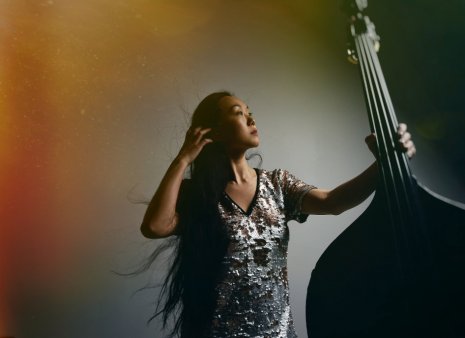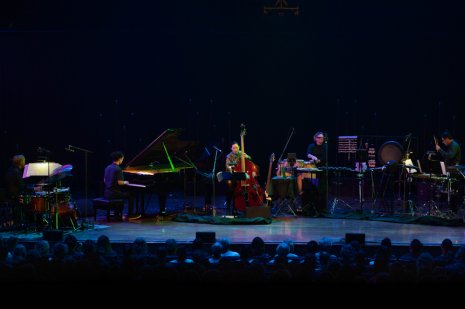In Linda's Words...
Empathy and universal human experiences (love, awe, fear) are important themes in my work. My hope is that with the music I create, we can look at these experiences together and find some common ground within this current world rife with division. The Glass Hours, (June 2023) is a collection of works based on abstract themes of the fragility of life and time. I hope that these themes, however abstract, will encourage the listener to question and reflect on this, to appreciate the moments of beauty and awe, and also be moved by the tenuous musical tugs-of-war conveyed through harmonic and rhythmic tension.
What we choose to do with our time reflects our character, our morals and values. I find myself increasingly fascinated, yet confused by the clashing values and paradoxes within the established systems in which we humans operate. Music helps me to process some of these thoughts.
The song Jus Ad Bellum, from The Glass Hours album, was inspired by readings from an International Human Rights course I undertook. The lyrics I wrote [below] describe the sheer "luck" of living/not-living in a war zone, and the "moral compass" nations use to justify actions of war. The obsession with "the other side" refers to religion and righteous passage to the afterlife which may drive these conflicts.
Draw your luck, draw your weapon
Hungry enough, to eat our own
Search for peace, search for heaven
Come now compass, lead us home
Lost in our own obsessions, with what's on the other side
How many sad processions, dispossessions, left so far
Sending our best and brightest, soaring into the stars
For reasons so just and righteous, who will catch these fallen stars.
Circles - the hedonic treadmill, another composition on The Glass Hours album, is a circular piece that I imagine to be a sort of Escher painting. It echoes the endless circles we find ourselves running in when we chase one pleasure or material object after another, thinking that doing so will lead us to final happiness, when we essentially lose touch of the beauty of the present. Antiquity is a caricature piece about a person blissfully stuck in the past, motivated by a yearning of what used to be, yet heavily influenced and imprisoned by television and social media.
My personal voice as a musician draws from many influences including Black American Music or jazz, creative improvisation, Western Classical music, Asian music and visual art. Initial Here, my 2011 album, written after a trip to Malaysia and China to visit long-unseen relatives, is a nod to my roots, and an exploration of the coexistence of the varied influences which informed my artistic foundations: everything from Ellington and Mingus to my roots as a bassoonist.
My composition Thicker than Water, with lyrics in Mandarin and English featuring vocalist Jen Shyu, is a tribute to the resilience of the matriarchs in my family. Born in Shanghai, my paternal grandmother was sold to a dance troupe in her teenage years, eventually ending up in Malaysia where she met my grandfather in a dance hall. My maternal grandmother was kidnapped from Southern China and taken to Malaysia. She was widowed three times with seven children and sold noodles on the side of the street on Ipoh Road (where my mother was born) to make ends meet. Despite leaving school at age 10, my mother speaks five languages and started her own sewing school at the age of 20 in Kuala Lumpur. I am in gratitude to these women for being. Their strength and resilience serve to be a constant reminder to me to persist in spite of obstacles we may face. They have inspired my work ethic and have instilled in me a strong sense of gratitude and responsibility for my work.
My music would not exist without my esteemed fellow colleagues/collaborators. I am currently working on duo material with pianist Fabian Almazan with whom I have been performing for the past 17 years. This year will be the premiere of my solo piano piece Littoral Tales written for pianist Gloria Cheng. My latest film score is for a short documentary about environmental law and climate change by filmmaker Sabrina McCormick. I hope to do more composing and commission work in the long-term future, as well as more collaborations with artists in other disciplines which reflect the causes which I am passionate about. I am grateful to my friends and fellow musicians who have inspired me and made my musicianship grow, such as Ambrose Akinmusire, Matt Mitchell, Greg Ward, Sara Serpa, Jen Shyu, Terri Lyne Carrington, Vijay Iyer, Tyshawn Sorey and many more.
My work Ephemeral Echoes debuted in March 2023 at the Perth Festival at Perth Concert Hall, as part of the Finding Our Voice commission series. Ephemeral Echoes consists of seven movements about the "ephemeral" transient nature of things - from the flickers of a firefly, the fleeting moments of early childhood, to everyday objects designed to become obsolete, like the iPhone or the incandescent light bulb. Using sample recordings and various ephemeral percussion objects, this collaborative composition features percussion trio and piano trio with lighting design.
We performed excerpts of Ephemeral Echoes at a Park Avenue Armory Skillshare, in particular a movement named Phoebus after the lightbulb cartel in the 1920's that deemed the lifespan of the average bulb to be 1000 hours in order to sell more bulbs (despite the fact that these bulbs could last far longer.) For this movement I sourced thick cut-glass light bulbs that would be played as percussion instruments. I've enjoyed watching this project develop with the percussionists in NYC as well as remotely with the Australian musicians and lighting designer who premiered this piece. I hope for this project to grow and be recorded as well as to tour this project and others, in various venues (in particular in rural, more unconventional spaces).
Walk Against Wind, my 2017 album, was inspired by the French pantomime artist Marcel Marceau and his piece Walking Against the Wind. I view it as a metaphor for fighting against obstacles while also embracing the beauty and pleasure to be found in taking the paths in life that offer greater challenges yet with richer rewards. I was inspired by Marceau’s graceful movements, as well as the beauty and depth of his ability to communicate non- verbally, something that I very much strive for as a musician and an improviser. Additionally, Marceau used his art for the benefit of humanity, joining the French Resistance and saving Jewish children from the concentration camps during World War II. With his pantomime skills he was able to keep them quiet and travel safely together across the border into Switzerland.
Themes of empathy and bridge-building are important to me on this album. One of the pieces, Mantis, based on a traditional Korean rhythm called “ochae chilgut,” was inspired by a collaboration at the 2013 Gwang Ju World Music Festival in Korea. The musicians were from Korea, Japan, and Australia with various musical backgrounds. Although we did not all speak the same language, we were able to communicate musically and improvise together, forming a set for the festival and recording an EP. Speech Impediment, from this album, is a narrative piece that tells the story of a man afflicted with a stutter who struggles to profess his feelings to the woman he loves. It was sparked, in part, by Australian singer-songwriter Megan Washington and her battles with stuttering, which I saw as a powerful example of people’s tendencies to overlook the depth of someone’s character in favor of more superficial judgments.
Whether sharing musical experiences with collaborators who don’t speak your verbal language, finding ways to speak when words fail, or finding the profound emotions in the mute performer’s work, a core idea that carries through the album Walk Against Wind is that of non-verbal communication, which I believe is a crucial element in improvised music. With the majority of mainstream music being quite pre-arranged and pre-determined, I believe it is extremely important to nurture and support improvised music and improvisation in music.
When improvising in music, one is encouraged to be in the present moment and create sounds specific to that space and time. In addition to being a creative form of expression for the individual, improvising with an ensemble encourages every member to listen to each other and work together. Improvising in an ensemble requires resourcefulness, quick decision-making, problem-solving, and assertiveness while also being flexible enough to adjust and respond to the other members in the ensemble. While the “success” of a performance can be subjective, the very act of working with these components, listening to each other, and working together are important human skills that I believe are important for everyone to experience and include in their lives.
I want to be an integral part of this community and I believe in informing wider audiences about improvised music, perhaps those who have not been exposed. Throughout my artistic career, I have been very fortunate to have learned so much from performing with more experienced musicians than myself. Playing with musicians such as Geri Allen, Terri Lyne Carrington, Pat Metheny, Joe Lovano, Kenny Barron, and Vijay Iyer to name a few, have helped me grow. I believe that mentorship is an essential part of the development of this music. I value teaching and mentoring young minds and hope to help make access to this information more equitable.



